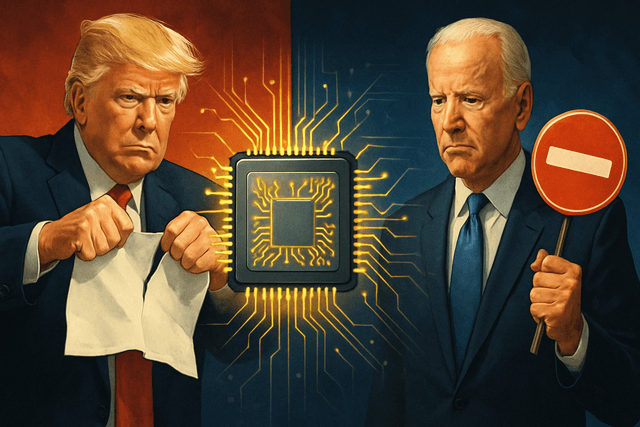The Trump administration has officially canceled a set of Biden-era restrictions on advanced AI chip exports, marking a significant shift in U.S. technology trade policy just days before the regulations were scheduled to take effect.
The Framework for Artificial Intelligence Diffusion, issued during the final week of the Biden presidency in January, would have sorted the world into three distinct tiers. The top tier, including 17 countries and Taiwan, would have received unlimited access to cutting-edge AI chips. A second tier of approximately 120 nations would have faced caps on chip quantities, while countries like China, Russia, Iran, and North Korea would have been completely blocked from accessing these advanced semiconductors.
"The Biden AI rule is overly complex, overly bureaucratic, and would stymie American innovation," a Department of Commerce spokesperson stated. Officials particularly objected to the tiered system, describing it as "unenforceable." The administration is now working on a replacement framework, though no specific timeline has been announced.
The decision represents a victory for chipmakers like Nvidia and AMD, whose executives have vocally opposed export restrictions. Nvidia CEO Jensen Huang recently warned that being locked out of the Chinese AI market would be a "tremendous loss," estimating it could reach $50 billion within the next few years. Nvidia's stock rose 3% following the announcement.
Critics of the Biden approach, including Microsoft, had argued that the tiered system would push second-tier countries to seek AI technology elsewhere, potentially from China. Senator Ted Cruz (R-Texas) praised Trump's decision, announcing plans to introduce legislation creating a "regulatory AI sandbox" modeled after the approach taken during the early internet era.
While the Trump administration has scrapped the tiered approach, it has maintained some restrictions on China's access to advanced AI technology. Last month, it required Nvidia to obtain special licenses to sell its H20 chips to Chinese customers, resulting in a $5.5 billion charge for the company. Analysts suggest the administration may be positioning U.S. chips as a powerful negotiating tool in ongoing trade talks with various nations.

